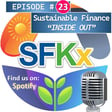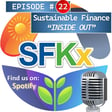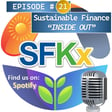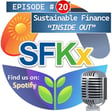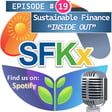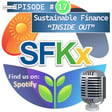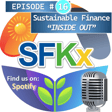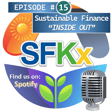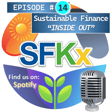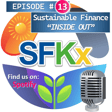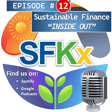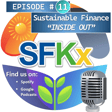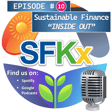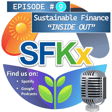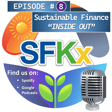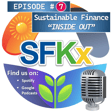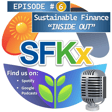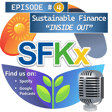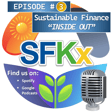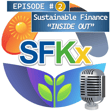Become a Creator today!Start creating today - Share your story with the world!
Start for free
00:00:00
00:00:01

SFKx Podcast Ep. 5 - Sustainable Finance "Inside Out"
Transcript
Introduction to SFKX Podcast 5
00:00:10
Speaker
Hello and welcome to the fifth edition of SFKX, sustainable finance inside our podcast. Once again, sustainable finance KX or knowledge exchange, a bit of a play on words there. But what we try to do is bring you and share with you the concepts, the knowledge, the theories, and more importantly, all that practical know-how that you need to get ahead in the sustainable finance field of works. So number five is going to be alive very soon. And to kick us off, here's the main man.
00:00:37
Speaker
SF Guru to take you through the latest news and market volumes. So, what's been happening mate?
00:00:43
Speaker
I
Challenges in Sustainable Finance
00:00:44
Speaker
believe things don't seem to be moving as fast as they need to be, right? Tell us more, please. Yeah, hi, SF DJ. Good morning, good afternoon, and good evening to all our listeners right around the globe. Thanks for the ongoing support of the podcast. As you alluded to, SF DJ, you're right. In terms of not moving fast enough, some of the volumes on sustainable finance are a bit patchy, but probably more the concern is, you know, what's the outcome of
00:01:08
Speaker
all the activity and sustainable finance really trying to cut emissions get to net zero and achieve other social and environmental outcomes and the UN's coming out with a pretty major report basically saying yet again we're not moving fast enough what that means is we've got to put more on the shopping list we've got to put it faster we've got a fun faster so i think that's sort of you know good and good and bad maybe short term some more volumes and pressure on those longer term we've got to get our act together
00:01:38
Speaker
Some of the volume forecasts I'd like and an interesting one from the Climate Bond Initiative, Sean Kidney, who's the CEO of that, a really good thinker on the market, and I'd highly recommend to anyone listening to our podcast to check out the various publications and sites.
00:01:54
Speaker
for the Climate Bond Initiative. Sean suggesting that a 5 trillion annual volume by 2025 is possible. That's a big jump from say the billion or so maybe or trillion. I should say we'll see maybe this year or next. Anyway, we don't go into too much on the market volume system broad brushstrokes. In terms of a few other volumes to mention, we talked about the SLL drop off in the last podcast. So check out that if you haven't heard our last podcast.
Shipping Emissions & Green Equities Update
00:02:22
Speaker
SLB is still under a bit of pressure with conjecture around what makes good targets and judgement calls on ambition of targets and that sort of thing ongoing. What else have we got here? DMV released a really good maritime forecast report updated in line with the IMO, the International
00:02:45
Speaker
as a monetary maritime organization who've updated their targets to ideally get to net zero pretty close to 2050 versus just a 50% reduction. Because that's such an important thing for shipping, we'll see a lot of the shipping deals probably increase their ambition and increase their rate of reduction rather than tacking to a minus 50% by 2050. A minus 100 is a pretty substantial gain. So do check
00:03:10
Speaker
Do check that out articles about some sustainable aviation fuel. So transport still a pretty key theme probably 10 to 10 percent of global emissions Again a key part of that shopping list and good to see something else that really jumped out SF DJ was
00:03:25
Speaker
articles about green equity the world's federation of exchanges as in stock exchanges release some guidance I think it's for public consultation I can't actually remember guidance on green equities and really we've seen a little bit of initiatives in that regard Nordic NASDAQ has had some designation for green equity dependent on
00:03:45
Speaker
amount of revenue that's aligned to taxonomies and the 50% threshold seems pretty low we've also seen that in london hasn't really taken off but i'd really like to see a labeled equity market even if it's specific equity raises even if it's different classes of shares very different ball game to debt
00:04:04
Speaker
but let's see how that goes. So the more guidance, very good, the more companies can shout about what they're doing and link what they're doing to capital raising. I think that's good because it gives us more disclosure, more ability to rate risks and NSS returns and fund really specific things. But I think some of those thresholds are a bit low, but a good, definitely a good start. We also saw
Regulatory Changes in the US & UK
00:04:27
Speaker
a couple of really interesting things come out during the New York Climate Week, the formal launch finally.
00:04:35
Speaker
of the taskforce for nature-based financial disclosure. So do check that out. A lot of sort of finalized guidance. And I think in many cases, we will see companies focus on that and start to really look at it and accelerate. So expect more use of process instruments connected to biodiversity in nature. Expect more sustainability-linked instruments connected with KPIs around conservation, biodiversity, and the different aspects of that.
00:05:05
Speaker
More talk about taxonomies, more talk about carbon capture, why the cost so high. It's still technically very difficult. It's been around for a while. Design, complexity, customisation. Hopefully we can get CCS more off the ground, so to speak.
00:05:23
Speaker
The other interesting thing, again, we like to talk about context of the podcast and what context leads to more pressure on disclosures and companies, because then banks can use those ingredients if you like. Something needs to be done, has to be done, has to be disclosed, and companies do that. The banks can work more to tie that into capital raisings, bonds, loans, and maybe even equity, and that's what sustainable finance is all about. California's come out with rules
00:05:51
Speaker
or proposals more stringent than the SEC actually. So even though the ESG politicization or weaponization in the US is ongoing, we're still seeing these undercurrents and California, if you consider it in its own right, probably the fourth or fifth
00:06:07
Speaker
biggest economy globally. And so I think that's really, really important and California continuing to be progressive. So that's, that's good stuff. There, what else we got? The other thing that I really liked SFTJ was the UK coming out with this updated green finance strategy paper. I think it's got a more fancy name, but the reason I liked that and I wanted to mention it is you're sitting in a bank
00:06:30
Speaker
people like us talking about these markets, those building blocks around disclosure reporting, taxonomies, push for investors, what they need to consider transition plans, it all sort of comes together to create the infrastructure and muscle to put on the bones of sustainable finance, linked instrument, use of process. If we don't keep adding that muscle of regulations, rules, disclosures of pushing companies and pushing investors,
00:06:58
Speaker
We're not going to see the ambition level we want and tying that back to the start of the podcast. We're not going to proceed at the accelerated rate we need to, and that's what it's about. Sustainable finance, it doesn't have an impact to accelerate, to reach that net zero faster and fund it. Well, it's not very useful.
UK's Sustainability Plans
00:07:17
Speaker
So anyway, let's jump and have a look at that. I really like just the pyramid structure of this, elements of UK transition plans, again, transition plan taskforce, looking at
00:07:27
Speaker
better guidance for companies on transition plans, SDR sense, sustainability disclosure regime, again, about what companies need to disclose, what companies, or sorry, what fund managers can call funds, all that labelling exercise is good, disclosures, tying that back to companies on the ISSB, linking that into the formal structure, and disclosure requirements in the UK, steps to standardise reporting for scope three, green taxonomies,
00:07:57
Speaker
risk management disposal framework related to nature, related to the banks, related to supervision, voluntary carbon loss. That's really upping the game on that and stewardship guidance to task investors with more. So that's a pretty much a smorgasbord of all the different planks.
00:08:14
Speaker
that are infecting companies, affecting banks and affecting investors to some extent. And that all creates a good environment to do more sustainable finance, again, with the goal to reach net zero quicker and not just fluff around. All right. ICMM, I'm going to say the International Committee for Mining and Minerals came out with a really good paper on scope three for mining.
00:08:40
Speaker
mining we need to support more there's lots of critical metals that are needed to reach net zero so check that out and we know that scope three for mining companies actually differs a lot whether something gold isn't really combusted, coals combusted
00:08:56
Speaker
So the sperm tree profiles of some lion company is actually quite different. We always
ICMM's Scope 3 Mining Paper
00:09:01
Speaker
need to bear in mind if we're talking about instruments or decarbonisation plants, it's got to be tailored to what the company actually does and where those risks and emissions profile is. So do check that out. What else have we got here? Good to see
00:09:16
Speaker
The science-based target initiative, ramping up the capacity, adding more people. That's really good to see. Ongoing articles about Shell and the outgoing CEO and the carbon capture articles about the corporate sustainability reporting initiative and the EU and how many companies are drawn into that. Articles about litigation, articles about S and social just transition, green and bubble, maybe taxonomies contribute to a limited pool of assets that are technically eligible in some markets.
00:09:46
Speaker
leading the bubble. So I guess at the end of the day, SF, SF DJ, and a couple more things to mention.
00:09:54
Speaker
Um,
ESG Performance & Investor Returns
00:09:55
Speaker
I think there'll be consultant in the UK or the US came out with an ESG global investor returns study. Do check that out. The basic conclusion was the better you do on ESG, the better your returns are, but there's a lot of insights into different segments and industries. And it's quite a long paper to summarize very quickly for the podcast, but we just want to make our listeners aware aware of that and what happens in different geographies and, um, uh, and, uh, and industry. So.
00:10:24
Speaker
You know, it's good. We want to see companies getting rewarded by valuation, rewarded by financing costs, cost of capital, the more that they do. Just to finish off this segment, SFTJ.
00:10:39
Speaker
Environmental Finance, a really excellent publication. You have to subscribe to a lot of those things. One paper that they put on their site was in relation to the sustainable loans market, both SLLs and use of proceeds. A really good paper and I'd highly suggest our listeners to check that out. SLLs continue to be a major part of the market. Use of proceeds, loan labeling, not so much.
00:11:05
Speaker
RCFs we talked about coming off a little bit on the Linked Loan side, Scope 3 being key, hardware-based sectors being key, biodiversity getting included, more social loans as well. That's still fairly, fairly new. So, SLLs. Very dominant. It's a proceeded loan.
00:11:23
Speaker
social somewhat so some really good graphs and dynamics there so I'd encourage people to check that out a lot of you know renewables on the use of proceeds side green buildings you know those those sorts of things and then a number of different KPIs that are being used again still the GHG
00:11:47
Speaker
KPI being used probably the most followed by gender equality and a variety of other things but it's a really good report still mitigation activities again being tasked with KPIs and also feeding back into the use of proceeds rather than adaptation and other and other various things so do check do check that out.
Reports & Initiatives in Sustainable Finance
00:12:09
Speaker
Private bonds initiative of being busy coming out with a paper about property and embedded
00:12:15
Speaker
Embodied emissions in there, check that out, hydrogen production and the various other pieces. And just a quick call out for SEB, a bank in the Nordics come out with a quarterly on paper that's an excellent, excellent resource and got some pretty interesting articles about how some KPIs are tracking in terms of various industries and utilities and energy maybe not doing so well, consumer,
00:12:44
Speaker
And what was the other major one? Communications and financial doing pretty well. So do check that out. Really interesting paper and well done to the SEB team for putting that.
00:12:53
Speaker
together. So maybe back to USFTJ that's a bit of a mouthful but lots of different things happening and we hope that again that context around what's happening paves a bit more stronger foundation for where we might see sustainable finance headed in coming months you know coming period in the direction of travel. It's still pretty good really. Thank you Mr. Gurri and good to see our Nordic or Scandinavian friends those banks also pretty good
00:13:22
Speaker
good content out and look again a plethora or as a smorgasbord as you put it of news and views so thanks to that extensive summary very very well put together but moving along as we always do can you please now take us through maybe some of the recent highlights recent movements recent happenings in the linked instruments area we know
00:13:41
Speaker
You know that always has some action. So how healthy or otherwise is that part of the market? Sometimes it can be tricky to get the loan volumes and the loan KPIs Disclosed in the market, but just just a couple of different things we wanted to highlight I think we talked about this in the last Podcast ENI one of the big oil and gas majors or maybe a similar maybe it was Rexel I can't actually remember coming out with the sustainability linked convertible
00:14:07
Speaker
convertible bond, looking at various GHG targets. Again, not everyone's cup of tea, but good that the more challenging effect is active in the sustainable finance market and then we can debate how good something is. There isn't, so check that out. See the IPG, I think on the infrastructure side of the digital owner there.
00:14:29
Speaker
I can't remember exactly what that one is, an SLB. Tying back to shipping that we talked about before, Costco is China's first ESG-linked shipping loan. So that's good to see. And PTSMI over in Indonesia, which is one of the infrastructure sort of funds government-owned, and offshore SLL-syndicated loan worth 700, I think about 700 mil US. So some different markets, some different sectors, and a couple of firsts in there, which is good.
00:14:57
Speaker
So what do we got next? SFGJ, that takes us to use of proceeds, is that right? Use of proceeds, that's right. So I think next up, use of proceeds or use of instruments, same as before, let's just give us the rundown. So the main ones on the use of proceeds side, again, we generally start with sovereign. Sovereign is a key because they catalyse the market, they set the tone, they set the policy. In many markets,
00:15:21
Speaker
or you've got markets like Australia where the government hasn't done something yet and the corporates sort of set the tone. But anyway, Romania, I believe, I believe, issued. Netherlands have done a few different things over the years, issued again. Egypt coming out with an intention to do some pandas. That's green bonds, I believe, issuing
00:15:41
Speaker
as an offshore entity into the Chinese market. We'll see how that goes. Denmark talking about some new sovereign bonds. Netherlands we talked about before. Then if we look at municipal Brazil's largest city preparing to go green, I think this one's pending there. On the banking side, again, pretty active.
00:16:02
Speaker
Fannie Mae's done a lot obviously on the mortgage side in the US, on the green side, some social side activity as well. Sparebank back in Europe, Takaz, African Development Bank, MBank. And again, the banking frameworks are really good still on the use of proceeds because they're very much
00:16:23
Speaker
Probably the widest framework. So if anyone out there is wondering what they can pitch to different customers, check out some of these frameworks. They're very, very expansive and the different geographies will take into account slightly different things. So do check that out. Post Office Le Bank Post Style. I'm going to say I think that is French.
00:16:43
Speaker
issued some time back going back to the to the market. AASC. What have we got here? Sunny, EDU. No, take that back. I can't even read my own notes. I mean, health care premier has issued issued something as well. Sustainable steel, high bar, pretty active.
00:17:06
Speaker
As a well Kenya doing some gender-based bonds And edge edge connect so lots of different things I may have misquoted a few of those but hopefully that gives our listeners a bit of a smattering of the different things that are happening again sovereigns key banks key and corporates again
00:17:26
Speaker
altering and moving into different geographies and different segments. But definitely check out those broader products in the bank. And that's actually good because they multiply so much. Corporates, it's a one deal. Bank will filter out and fund right across their books. Always good to see a healthy bond market in terms of the banks and hopefully over time a few different types of SLBs across the banks as well. But let's see.
00:17:53
Speaker
All right, I think Murray, is Murray joining us today, our favorite spot? Yeah, yeah, we're just about through this episode. We always finish
Finding KPIs for Sustainability-linked Finance
00:18:03
Speaker
with a couple of FAQs. We've got two FAQs or frequently asked questions from our mate Murray that puts these questions to us. The first one for you, SF gurus, where is the best place to get KPIs for SLLs and SLBs, please?
00:18:19
Speaker
Very good question, Murray. Well done for that. So there's a variety of places you can look for these things. I'd say the first one is comparative transactions, transactions that's been done before. Not the be all and end all, some deals are probably not on the...
00:18:34
Speaker
overly ambitious sort of scale but you know transactions that have been done check those out. The EU taxonomy, lots of good technical performance thresholds, things like the ICMA registry around KPIs, check that out.
00:18:51
Speaker
And then you've got various industry initiatives such as the IMO on the shipping side, then also things like the transition pathway initiative, science based aga initiative, you've got these different types of reference, even the CBI, the climate bonds initiative have different
00:19:08
Speaker
different papers about steel, about hydrogen, about Agri. And there's some really good thresholds you can sort of extract out of there. I've seen standards about some things as well. And then really just best in class reporting for some sectors. If there's an Agri company, have a look at some of the peers who are best in class around water usage and those things. So a whole range of areas where you can take some reference from for sure.
00:19:40
Speaker
Mr. Guru, one more question. What is the future for social bonds and loans? Now you touched on this in the earlier part of the podcast, but let's just hone in on that question again. Please, the future of social bonds and loans.
00:19:56
Speaker
I'm a little bit surprised about some of the tone of the articles over the last few months. I think it was natural that pre-COVID, there wasn't really social use of proceeds for loan guidance on the social side. There's always bonds. It was only ever 5% to 10% of the market, boom to 20%, 25% with multilaterals dominating issuance in significant parts of COVID.
00:20:24
Speaker
Since COVID, the volumes have gone down, but I don't think it's going anywhere, and I still think it has a very useful role in the market. It's just more difficult. As we know, green is more scientific, green is more global, social is more local, and there's not as many taxonomies, or really any.
00:20:44
Speaker
although it's a piece of work that's being developed in Europe and other sort of markets starting to sort of kick go and dance around that. When that happens, I think that'll boost back up again. And what's happened is companies want more flexibility and will go somewhat around the sustainability label, incorporating green and social stuff. You strip all those out, do a couple of somersaults, slam on your feet and have a really look at that. I think it's not as bad in terms of volume reduction.
00:21:13
Speaker
And there is definitely a role to play, but we all need to develop a better vocab of social impact.
00:21:20
Speaker
a way to code the impact. And I think some of these other initiatives that we always talk about, from a broader contextual point of view on disclosures and some of the other things we talked about, even under that UK plan and green finance strategy, it's just it's just going to help. So I think the question will be, when will we see more and when will we see much more pointed transactions around social in terms of pushing the boundaries of what's getting funded and how the impact of that's getting measured.
00:21:54
Speaker
Now, as
Integrating Sustainability Across Sectors
00:21:55
Speaker
we come to a close, in most of our podcasts, SFG, we sort of finish on an area where we always talk about products or programs that integrate sustainability into the day-to-day sector. So can you please take us through that as a final topic? Absolutely. So look, at the end of the day, not a whole lot of new programs or new products. The first one just to mention is fund activity. So I think some of the banks are getting up to speed on this in terms of funding entities.
00:22:22
Speaker
and then debt getting lent from, you know, debt front. Penn to Green is a good example and there was a whole solar program. I think in the Philippines done for that. Launches of commercial mortgages with green discounts in the UK, nothing new there. Debt to nature swaps we've talked about and is that a good thing? Is it a bad thing? Should a sovereign be able to say, hey, we're not going to pay back 20% of our
00:22:48
Speaker
sovereign bonds, we're going to swap that into lower rates of interest provided by someone else as long as we commit to doing certain environmental things. Again, this is a mixture of products, structures. Cold buyouts are going to continue to be pretty topical. FinTech, sustainability tech, climate tech, talking about that again.
00:23:13
Speaker
different hedge funds, buying green, what else was in here, trade finance as well. So they came out with a great report about the trade financing gap. But again, at the end of the day, we still need stuff, machinery, equipment to get us to net zero, not the be all and end all. At the end of the day, a big infrastructure component to this and infrastructure is about building things, manufacturing also making things.
00:23:40
Speaker
So a lot of that stuff moves from export credit agencies and moves between countries and trade finance is a big part. And the market is certainly much more accepting of shorter transactional flow tenors than it was in the past. And I think that's good, but the market's still wrestling with, okay, even if there's a trade finance gap, how do we fund it? How do we label it? Because labeling certain transactions green sustainability link can only help banks support more trade.
00:24:09
Speaker
more trade it's supported more sustainable finance is supported if it's done right should have a better impact and all about the acceleration we've been talking about it's an undertone for the podcast so yeah that's um that's about me over and out for uh this episode uh sfdj back to you to wrap us up thanks again uh i think a nice iced tea with a bit of lemon maybe just to ease your tonsils after that one that was a big uh big update so look that's it um that's all we have time for in our fifth episode
00:24:38
Speaker
Just the other day, we were popping our cork, so I'm getting the first one out there, so it has grown very fast. If you like these recordings, please check us out at the website, sustainablefinancekx.com. That'll take you to all our socials, where you can find these at these podcasts. Anyway, I've been SF DJ, my good friend's been SF Guru. Take care, and we'll catch you next time.
